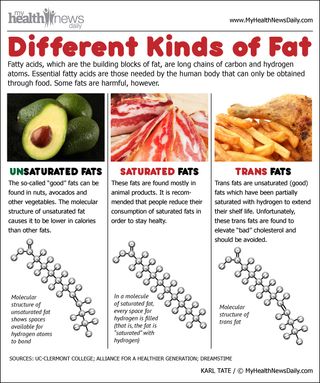The Truth About Trans Fats

Until 1983, if you ordered a fried goodie at a typical fast food joint, you'd get a crispy, golden product that had been fried in a vat of beef tallow or tropical oils, which are rich in saturated fat.
By 1984, consumer groups had learned that saturated fats go with heart attacks like burgers go with fries , so they clamored for a change. Restaurants replaced their old frying oils with partially hydrogenated vegetable oil, which contains trans fats.
There was just one problem: trans fats turned out to be even unhealthier than saturated fats.
A fat molecule is a funny thing. Its molecular structure looks kind of like a jellyfish. It consists of a glycerol molecule, which is like the jellyfish's "head," and three long fatty acids, which look like long tentacles, and are the building blocks of fats.
These fatty acid tentacles can be straight or kinky, and in general, the kinkier the tentacle, the healthier the fat . Unsaturated fatty acids, such as those found in olive oil (liquid fats are called oils), have all kinds of bends and angles. The fatty acid tentacles on saturated fats, on the other hand, are perfectly straight. [Story continues below infographic]

Trans fats are actually unsaturated fats, but because of the angle of the "trans" chemical bond that gives them their name, trans fatty acids molecules are straight, like saturated fats.
This means trans fats behave in the body almost like an uber-saturated fat. They're even more unhealthy than saturated fats, because they simultaneously raise levels of "bad" LDL cholesterol, and lower levels of "good" HDL cholesterol to a greater degree than saturated fat. This one-two punch promotes the development of heart disease.
Sign up for the Live Science daily newsletter now
Get the world’s most fascinating discoveries delivered straight to your inbox.
In 2006, the United States government mandated that trans fat levels be listed on nutritional labels. New York City and the state of California have since banned trans fats from restaurant food.
Trans fats are not beneficial in any quantity, so health experts recommend avoiding them whenever possible. You're most likely to come across them in fast foods, manufactured baked goods and certain vegetable spreads, although they are less prevalent now than they were a few years ago.
Pass it on: Avoid trans fats whenever possible.
- 6 Foods That Are Good For Your Brain
- 7 Foods You Can Overdose On
- 5 Surprising Ways to Be Heart Healthy
Follow MyHealthNewsDaily on Twitter @MyHealth_MHND. Find us on Facebook.












